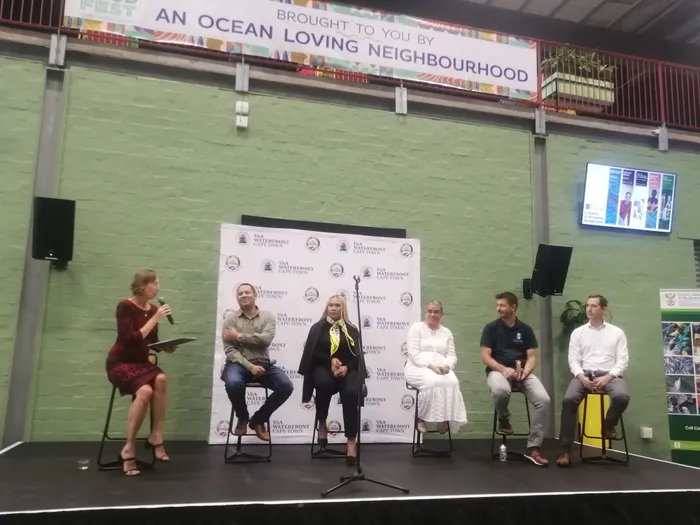Waterfront hosts discussion on sustainable seafood

The panel of the sustainable seafood workshop are, from left, Dr Judy Mann, executive for strategic projects from the Two Oceans Education Foundation; WWF senior manager Craig Smith; Buyekezwa Polo of the national Department of Environment, Forestry and Fisheries; chairperson of The West Coast Rock Lobster Association, Shamera Daniels, director of growth at ABALOBI Chris Kastern and senior programme manager, Africa, Middle East and South Asia at Marine Stewardship Council (MSC) Michael Marriott.
The V&A Waterfront held a workshop on sustainable seafood last Friday, March 31, ahead of its inaugural seafood festival, which took place at Makers’ Landing over the weekend.
The workshop was hosted by Dr Judy Mann, executive for strategic projects from the Two Oceans Education Foundation, and panelists included senior programme manager for Africa, Middle East and South Asia at Marine Stewardship Council (MSC) Michael Marriott; director of growth at ABALOBI Chris Kastern; Buyekezwa Polo of the national Department of Environment, Forestry and Fisheries; WWF senior manager Craig Smith and chairperson of The West Coast Rock Lobster Association, Shamera Daniels.
In introducing the workshop, the Waterfront’s programme manager for social inclusion, Henry Matheys said the ocean was the livelihood in many communities.
He said the Waterfront had many connections to the ocean and the food it provides, including in restaurants in the precinct; about 60 small fishing vessels operating in the precinct, as well as I&J and Sea Harvest at the dock.
He said while Makers’ Landing was created to provide a seat at the table for everyone, it was also meant to stimulate conversations, with this event focusing on sustainable fishing, and a discussion on how people can preserve the ocean life for future generations to enjoy.
Mr Smith said over 70% of fisheries are exploited daily due to many factors - the main one being socio-economic issues including unemployment in coastal communities which lead to social ills and crime. He said there were socio-economic issues that arise when fisheries are not managed properly, and people should learn to understand the impact the species being caught has on the environment.
Ms Daniels added that while South Africa had been lauded for management of its fisheries, there were still people poaching.
She said when it comes to the South African Rock Lobster, or kreef, there was a sense of entitlement from communities to have access to it. However, if people are not aware of how to manage the fishing, in five years’ time, there will be no lobster.
“The illegal lobster trade is growing.”
She advised stakeholders and visitors to question where the lobsters they serve, or are served, came from to make sure that the illegal poaching of lobsters is not supported, and that there will be lobster for future generations to enjoy.
Mr Kastern said educating fishing communities on sustainable fishing helped them garner market support, as well as worked towards sustainable and thriving fishing communities.
Asked about choosing sustainable seafood and its complications, Mr Marriott said everyone had different expectations for what sustainability was, which was difficult to unpack. “It's a very complex marina to operate in.”
Ms Daniels added that while stakeholders are looking for a one-size-fits-all solution, there was not one. “The sooner we realise that, we can move forward.”
She said now that it was Easter, people were waiting for snoek, but it was not as easy as making them appear when they are in demand. “It's a critical conversation we need to spend more time on.”
Ms Polo said the government took a holistic approach to make sure the future generations can benefit from the fishing industry.
She said the government was zooming in on local fishing communities who were fishing illegally.
She said a discussion around accessibility and quota applications needed to take place. “At the end of the day, we don’t want them (fishermen) to fish illegally, and we need to sit down with local fishers to discuss this complex matter, as well as engage everyone in the industry. We need to open opportunities for our communities and create accessibility to quotas.
Mr Smith said the issues can be unpacked if the industry knew what they were procuring. He said there were also different methods to catch fish so that people can learn about the fishery process. He encouraged visitors to restaurants to ask about the fish they are being served, and advised interested parties to download a smartphone app called SASSI, which allows you to check the sustainability of your seafood choice in real time.
Asked how people could get involved in sustainability when it comes to seafood, Ms Daniels said they should ask the hard questions - ask the restaurateur about the dish served and be part of the tracing process.
Mr Kastern encouraged people to support coastal communities, buy from them and celebrate their stories, and to make a space on menus to include catch that come from coastal communities.
Meanwhile, Ms Polo encouraged collaboration between big companies and smaller enterprises to better access trade.